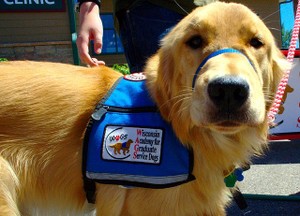For returning veterans of war suffering with PTSD, normal everyday tasks like heading to a busy supermarket or a crowded park can become frightening and anxiety ridden experiences. For some, the transition back to civilian life seems impossible - Eighteen American Veterans commit suicide every day, surviving the dangers of war only to become victims of its legacy once back home.1
Who is hiding at the end of that aisle? Is someone sneaking up on me from behind?
For some, PTSD symptoms don’t go away easily, despite therapies tried and medications used, but now people having difficulty getting over the horrors of a war left behind have a new tool to make the transition back to safe society a little bit easier – specially trained PTSD helper dogs.
A vet with PTSD may know logically that the library or the supermarket holds little threat of attack, but the hyper vigilance of PTSD means that every situation is viewed as a potential threat and behind every bookshelf in that library is a potential enemy. Having a dog you trust maintain vigilance for you lets you lower your guard a bit.
Trained dogs assist people with PTSD perform basic tasks and overcome some of the more debilitating symptoms of the anxiety condition. The dogs can be trained to help veterans take medication at scheduled times or will awake a person having a nightmare. They are taught how to turn on the lights when their handler gets disoriented or confused and when out in public they act as an extra pair of eyes and ears to watch what’s coming from behind or what might be sneaking around corners. They are even trained to give their handlers a doggy hug on command, a gesture of reassurance that can relieve a lot of stress from a situation of temporary anxiety.
Some of the commands the dogs learn include:
- Block – a command given to have the dog move into a position to protect a buffer of personal space
- Hug – to have the dog give a sort of hug, in moments of anxiety
- Out – to have the dog move forward to check around unseen corners for any possible threats
- Watch – to have the dog take a position of vigilance behind you; to watch your back
According to PTSD expert, Tracy Stecker, Ph.D of Dartmouth Medical School, some reasons why trained service dogs can be so beneficial to people with PTSD are:
- They are Vigilant – They keep watch for you so you can lower your guard slightly
- They Take Orders – Dogs respond to commands. Things are very black and white and there is no debate about things, which can be a comfort to people used to a rigid military system
- They Are Ready to Protect You – Knowing your dog is always at your side and always ready to protect you can be a comfort
- They Offer Unconditional Love – They can help ease what is sometimes a difficult transition out of military life by loving you for you, no matter how difficult you are finding life in the real world
- Dogs Teach Trust and Love – A trained service dog is completely trustworthy. Through this perfect trust people can regain some faith notions of trust and love that are sometimes shattered by the experiences of war2
- References
Page last updated Dec 15, 2012


